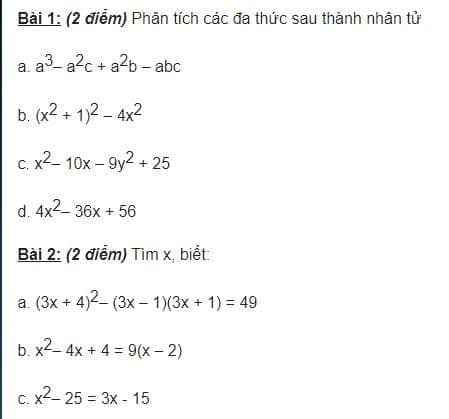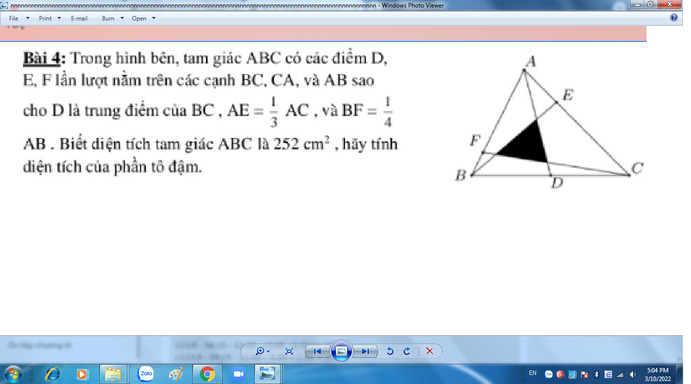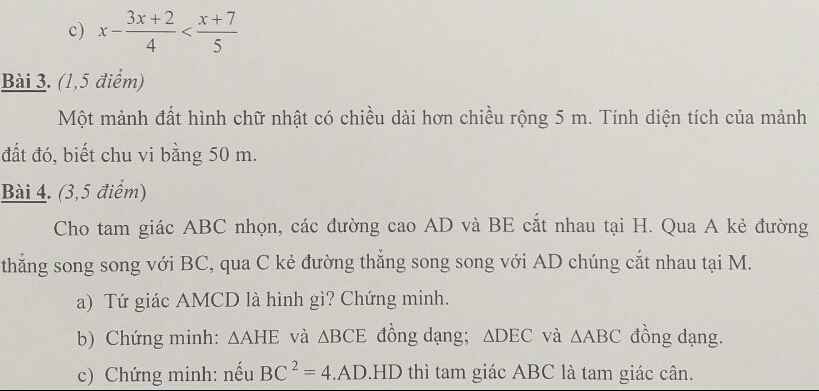
Hãy nhập câu hỏi của bạn vào đây, nếu là tài khoản VIP, bạn sẽ được ưu tiên trả lời.


Bài 1:
Vận tốc cano khi dòng nước lặng là: $25-2=23$ (km/h)
Bài 2:
Đổi 1 giờ 48 phút = 1,8 giờ
Độ dài quãng đường AB: $1,8\times 25=45$ (km)
Vận tốc ngược dòng là: $25-2,5-2,5=20$ (km/h)
Cano ngược dòng từ B về A hết:
$45:20=2,25$ giờ = 2 giờ 15 phút.

Bài 1:
a.
$a^3-a^2c+a^2b-abc=a^2(a-c)+ab(a-c)$
$=(a-c)(a^2+ab)=(a-c)a(a+b)=a(a-c)(a+b)$
b.
$(x^2+1)^2-4x^2=(x^2+1)^2-(2x)^2=(x^2+1-2x)(x^2+1+2x)$
$=(x-1)^2(x+1)^2$
c.
$x^2-10x-9y^2+25=(x^2-10x+25)-9y^2$
$=(x-5)^2-(3y)^2=(x-5-3y)(x-5+3y)$
d.
$4x^2-36x+56=4(x^2-9x+14)=4(x^2-2x-7x+14)$
$=4[x(x-2)-7(x-2)]=4(x-2)(x-7)$
Bài 2:
a. $(3x+4)^2-(3x-1)(3x+1)=49$
$\Leftrightarrow (3x+4)^2-[(3x)^2-1]=49$
$\Leftrightarrow (3x+4)^2-(3x)^2=48$
$\Leftrightarrow (3x+4-3x)(3x+4+3x)=48$
$\Leftrightarrow 4(6x+4)=48$
$\Leftrightarrow 6x+4=12$
$\Leftrightarrow 6x=8$
$\Leftrightarrow x=\frac{4}{3}$
b. $x^2-4x+4=9(x-2)$
$\Leftrightarrow (x-2)^2=9(x-2)$
$\Leftrightarrow (x-2)(x-2-9)=0$
$\Leftrightarrow (x-2)(x-11)=0$
$\Leftrightarrow x-2=0$ hoặc $x-11=0$
$\Leftrightarrow x=2$ hoặc $x=11$
c.
$x^2-25=3x-15$
$\Leftrightarrow (x-5)(x+5)=3(x-5)$
$\Leftrightarrow (x-5)(x+5-3)=0$
$\Leftrightarrow (x-5)(x+2)=0$
$\Leftrightarrow x-5=0$ hoặc $x+2=0$
$\Leftrightarrow x=5$ hoặc $x=-2$

Đề sai nên mình sửa chút , 214 chứ không phải 2014 .
(x-214)/86 + (x-132)/84 + (x-54)/82 = 6
- (x-214)/86 + (x-132)/84 + (x-54)/82 - 6 =0
- (x-214)/86 - 1 + (x-132)/84 -2 +(x-54)/82 - 3 =0
- (x-300)/86 + (x-300)/84 +(x-300)/82 =0
- (x - 300 )(1/86 +1/84 +1/82 )=0
- x - 300=0
- x =300 vì 1/86 +1/84 +1/82 khác 0.

\(3x^2+7x-20=0\\ < =>3x^2+12x-5x-20=0\\ < =>3x\left(x+4\right)-5\left(x+4\right)=0\\ < =>\left(x+4\right)\left(3x-5\right)=0\\ =>\left\{{}\begin{matrix}x+4=0\\3x-5=0\end{matrix}\right.\\ =>\left\{{}\begin{matrix}x=-4\\x=\dfrac{5}{3}\end{matrix}\right.\)
Vậy: Tập nghiệm của phương trình là \(S=\left\{-4;\dfrac{5}{3}\right\}\)
do câu hỏi của lớp 8 nên mình làm ntn nha:
pt <=> \(3x^2+7x=20\)
<=> \(x^2+\dfrac{7}{3}x=\dfrac{20}{3}\)
<=> \(x^2+2.\dfrac{\dfrac{7}{3}}{2}x+\dfrac{49}{36}-\dfrac{49}{36}=\dfrac{20}{3}\) <=> \(\left(x+\dfrac{7}{6}\right)^2=\dfrac{49}{36}+\dfrac{20}{3}\)
<=> \(\left(x+\dfrac{7}{6}\right)^2=\dfrac{289}{36}\)
<=> x+7/6 = \(\pm\sqrt{\dfrac{289}{36}}\)
<=> \(\left[{}\begin{matrix}x=\dfrac{5}{3}\\x=-4\end{matrix}\right.\)

Bài 3:
Gọi x(m) là chiều rộng của mảnh đất(Điều kiện: x>0)
Chiều dài của mảnh đất là: x+5(m)
Theo đề, ta có phương trình:
2x+5=25
\(\Leftrightarrow2x=20\)
hay x=10(thỏa ĐK)
Vậy: Diện tích của mảnh đất là 150m2

a) Hình a biểu diễn tập nghiệm của bất phương trình x ≤ 6
b) Hình b biểu diễn tập nghiệm của bất phương trình x > 2
c) Hình c biểu diễn tập nghiệm của bất phương trình x ≥ 5
d) Hình d biểu diễn tập nghiệm của bất phương trình x < -1







j, <=> 2x + 2 = 5x - 7 <=> -3x = -9 <=> x = 3
k, 2x + 6 = 0 <=> 2x = -6 <=> x = -3
l, <=> 4x + 2 - 3x + 6 = 12 - 8x -12x
<=> x + 8 = -20x + 12 <=> 21x = 4 <=> x = 4/21
Tách nhỏ câu hỏi ra bạn